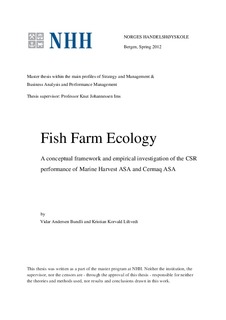| dc.contributor.author | Bundli, Vidar Andersen | |
| dc.contributor.author | Liltvedt, Kristian Korvald | |
| dc.date.accessioned | 2012-08-10T08:01:25Z | |
| dc.date.available | 2012-08-10T08:01:25Z | |
| dc.date.issued | 2012 | |
| dc.identifier.uri | http://hdl.handle.net/11250/169549 | |
| dc.description.abstract | The purpose of this master thesis is to give business participants, regulatory authorities, researchers and the broader community awareness of priority areas within the fish farming industry. In this sense, we have developed a conceptual framework; Fish Farm Ecology (FFE). The FFE model equates three spheres; economy, ecology, and ichthyology. It has flexibility and can be used both as an analytical tool for a broader interest group and as a management tool for companies within the industry. The conceptual framework and the empirical investigation are based upon five context areas; fish feed, sea cages, escaping, sea lice, and the slaughter process. In the empirical investigation, which is concentrated around two companies; Marine Harvest ASA and Cermaq ASA, perspectives of CSR and ethics are included. The CSR-FFE performance of Marine Harvest lies within the upper edge of a minor link, while Cermaq’s lies within the intermediate link. | no_NO |
| dc.language.iso | eng | no_NO |
| dc.subject | business analysis and performance management | no_NO |
| dc.subject | strategy and management | no_NO |
| dc.subject | corporate social responsibility | |
| dc.title | Fish farm ecology : a conceptual framework and empirical investigation of the CSR performance of Marine Harvest ASA and Cermaq ASA | no_NO |
| dc.type | Master thesis | no_NO |
| dc.subject.nsi | VDP::Social science: 200::Economics: 210::Business: 213 | no_NO |
| dc.subject.nsi | VDP::Agriculture and fishery disciplines: 900::Fisheries science: 920 | no_NO |
